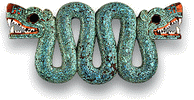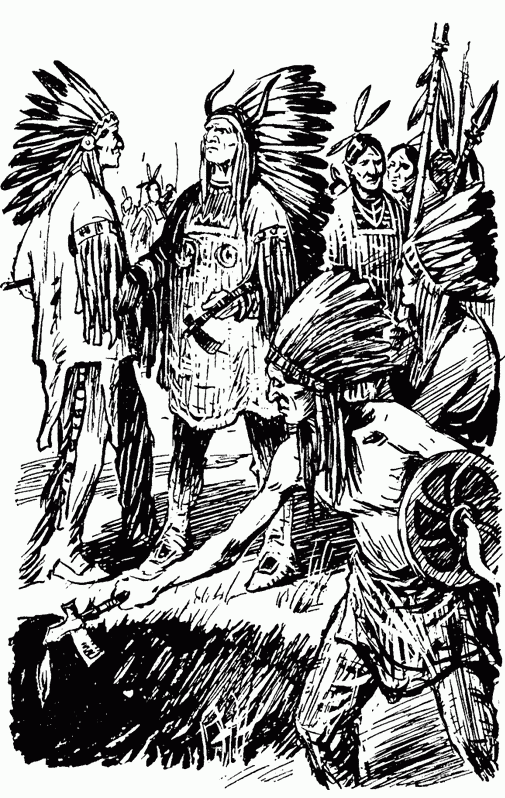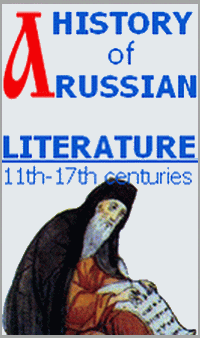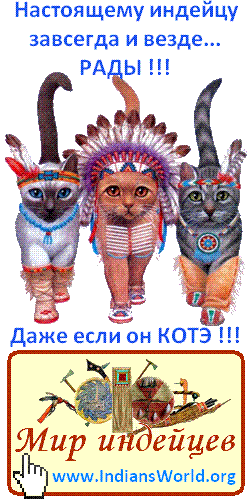HOW THE TOMAHAWK WAS BURIED
Category: TalesA Legend of Peace
A long time ago there was in one village a very wise chief. He had fought many a battle and everybody knew that he was the strongest and bravest of all the warriors that ever lived.
One day he sat looking at the little children who were playing in front of the village longhouse, and his thoughts were sad. What will become of these gay little things when they grow up? Maybe the boys will become brave warriors, as he was; but how many of them will live to his age? They may fight many battles and take many scalps, but the time will come when all of them will be killed one after another, and their own scalps will be taken by their enemies. And these pretty little girls — what will become of them? This can be easily told: some of them will be stolen by the warriors of other villages and will die far from their homes; the rest will marry young warriors of their own village and for a time will be happy. But grief and sorrow will cover their pretty faces with wrinkles, and hard work will bend their backs and they will become old women too early, yes, too early indeed. But is there a woman who will remain young and gay when she has lost her husband and has to bring up her children without the help of their father?
The wise chief spent many days and nights thinking about the life of his people. He felt that men and women were born not for endless wars and sorrow, but for peaceful toil and happiness. At last he decided to call his people to a council and tell them his opinion. He was sure that they would agree with him.
So a council was held in the longhouse. When everybody came, the chief arose and began to speak. He spoke about the wars of the past and the wars of today; he showed that wars never brought happiness to the people and that men and women and little children were happy only when they lived in peace. He spoke about the proud scalp-hunters who attacked lone warriors and killed them to take their scalps, and who, in their turn, were also killed. It was natural to hunt for game, he said, but it was unnatural to hunt for scalps; the first man who used his tomahawk to take his enemy’s scalp, was a bad man, a cruel man, who wanted to boast of his victory. This was an old custom’, he said, but it-was a bad custom, and it must be changed. If their fathers’ ahd: grandfathers lived in a wrong way, there: was no reason why their children should live in the same way. Thus spoke the wise chief, and the other chiefs of his village and all the warriors listened and felt that his words were true.’ They talked the matter over and decided that they would put warpaint on their faces only when they had to defend their village and that they would never, enter upon the war-path at their own will.
Thus peace was established in the village of the wise chief. But at the council they had also decided to send a message of peace to the neighbouring village. Two young men, who were great friends and always spent their time together, said that they wanted to carry the message to the chief of that village. The wise chief told them how to approach the village and how to speak there.
Early in the morning all the village gathered near the longhouse to see them off. They ran from the longhouse between two lines of people who greeted them with loud cheers.
Soon the two young warriors were in the forest. Here they stopped, took out their charms and changed themselves into a wolf and an owl. In this shape they could travel much faster. When they were near the neighbouring village, they changed themselves into men. They buried their weapons, washed off all war-paint from their faces, and gave the long call of distress, “Goh-weh!”
Soon someone in the village heard the call, and ran to the chief to tell about it. The chief sent a party of warriors to meet the strangers. The chief of the party was astonished to see two of their enemies coming up from the forest, but as they were without war-paint on their faces and without any weapons in their hands, he took them to the chief.
The elder of the two young men addressed the chief and told him that they had brought a message of peace; then he spoke as he was taught while the chief listened in silence. Then the chief said:
“The thoughts of your chief are my thoughts. But I must ask the opinion of my people. Rest till to-morrow. You will be my guests. In the morning we shall hold a council, and then I shall give you my answer.”
In the morning the council was held, and the chief told his people about the message of peace which he had received. He asked them to say what they thought about it. Some of the war-chiefs spoke against peace, but the greater part of the people were in favour of accepting the message of peace. Then the chief rose and said:
“Let nobody think that I am a coward. But peace is better than war. Here is the message which I shall send back to my friend: ‘Let us, the people of two neighbouring villages, always live as brothers. I, the chief of my people, accept every word of the message of peace sent by my wise friend. Let us at once cover the hot coals fo hatred with the cool ashes of peace and let these coals burn down; the fire of war must never burn again. In four days’ time we shall meet half-way between our villages, in the open field near the river. There we shall dig a pit, and at this pit we shall hold each other’s hand in friendship and peace, — my brother and I. Then into this pit we shall throw all weapons of war and bury them, together with all hatred, in one grave. And after that we shall live as brothers. Weapons will be used only for hunting. The war-cry will be heard only when we shall dance our old dances to show our young people what we had done in the past. Let our meeting take place at noon, and let all the people of our villages come to watch our meeting. I have spoken. My young friends, I ask you to stay with me as my guests till tomorow. And now let us celebrate this great event with songs and dances.”
Early in the morning the two young men came with the chief to the village longhouse, where two beautiful maidens gave them new moccassins for their travel. After some words of parting the young warriors started running between two lines of people, who waved their hands and smiled at them as at friends.
The young men travelled home in the same way as before. They reached their village safely and were met by their people and the chief with great joy. A feast was prepared to celebrate the great event.
The wise chief warned everyone to be ready to set out on the fourth day at dawn and to take all weapons, leaving only those that were necessary for hunting. For three days the whole village sang and danced — so great was the joy of the people when they thought that the danger of war was over for ever. On the fourth day they gathered at the longhouse in their best dress and set out to the open field near the river. They reached it at noon and saw that the people of the neighbouring village were approaching from the other side.
The two chiefs walked to the middle of the field holding out their right hands as a sign of peace and friendship. The right hand is the hand that holds the tomahawk in battle, but now they carried their tomahawks in the crook of their left arms. The warriors of both villages advanced in a file behind their chiefs. When the chiefs met, they clasped each other’s right hand as brothers. Then they took their tomahawks and threw them into the pit. All the warriors did the same in their turn. Thus the tomahawk was buried together with hatred and other bad feelings. And thus peace and happiness came to the people of two Indian villages.
Let us hope that in the same way peace and happiness will come to all the peoples of the world.



